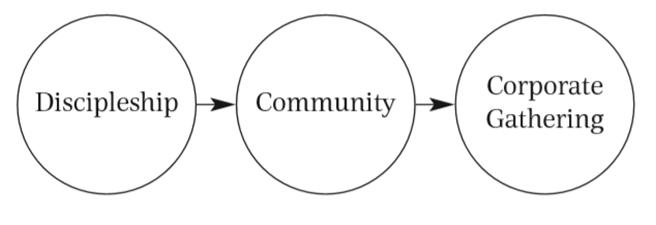The major view today is that people encounter Jesus and grow as disciples in a church. It is interesting to note that there is a lack of Biblical examples of this view of disciple-making. People met Jesus at the side of wells, in cemeteries, in the country and were discipled in homes, on hill-sides or walking from town to town.
I am not suggesting that Christ-followers did not subsequently meet together and grow together and worship together. But what I am saying is that for too long now we have been viewing things through institutional lenses to the point where we believe that disciples need the ‘institution’ more than they need a direct, close, Spirit-led relationship with Jesus.
The following diagrams expand on what I am saying here and show a different way of looking at discipleship as it relates to the essential aspects of a disciple’s life.

When Jesus began His ministry, His starting point was to make disciples. As these disciples grew in number they formed into small communities. Later in the history of the church, larger corporate gatherings and buildings began to play a bigger role.
Even though all three groupings have been a part of the historical development of the church, I believe Jesus had a reason for moving outside of the structured religious norm to begin something fresh and new. He established a pattern of making disciples who made other disciples, setting in place the potential for unlimited growth of His church worldwide. Disciples were grouped as the need arose and out of the rapid growth grew different forms of corporate gathering.
It was not until the Emperor Constantine made Christianity the state religion that the corporate gathering encompassed all three areas and the building started to become the centre of all activity. The church today continues to try to delineate the three areas but, with the preeminence of the corporate gathering so entrenched (usually in a specific building), the process now moves in the reverse direction from what Jesus originally established.

We operate from the belief that, once a strong corporate gathering is established as the central focus, we then form small communities hoping that they will eventually bridge the gap with those who do not yet have a relationship with Jesus.
It has become my firm belief that this reverse process can never work effectively.
There is nothing intrinsically wrong with these three aspects of the disciple’s life but they do achieve entirely different things. If we plan to reverse the current process back to the model given to us by Jesus, we need to clearly understand the purpose of each of these three aspects and ensure that every disciple of Jesus is aware of and equipped to fulfil the mandate of “as you go, make disciples…”
• Discipleship. At the beginning the journey is all about loving God, loving others and making disciples. At this stage loving God is a personal, intimate journey. Loving others is two-fold: loving people as I live and relate with them in a small faith community and loving others with the compassion of Jesus which motivates me to make disciples.
• Community. Based on the acronym made popular by Carl George, the smaller community is about loving, learning, deciding and doing. Loving relates to living with others. Learning is discussing my life questions with other disciples. Deciding is agreeing with others to make changes in my life. Doing is following through on decisions made as I share my journey with my small community.
• Corporate gathering. If I use the work of Dr. Robert Webber, the corporate gathering covers four specific things.
– The first is worship which starts with God as omnipotent and far above our human attempts to understand and define Him.
– The second is the preaching which God uses to reinforce the journey of discipleship. It is simply another opportunity to hear God.
– The third aspect is the celebration of God’s work through His intimate connection with people.
– The fourth aspect of the corporate is the benediction and commissioning. It is the recognition of God’s love for me that compels me to make disciples. Coming in to worship, connect and celebrate; going out to make disciples.
If we start with the church essentially being the corporate gathering, then the smaller communities and the process of making disciples become systematised and mechanistic processes of the institution. If we start with “as you go about your normal life, make disciples”, then the process becomes organic and relational.
My theological training facilitated the more institutional approach to making disciples but my initial connection with Jesus constantly pulls me back to the organic, relational approach to discipleship. As I talk with groups of Christian leaders about this important matter of making disciples, I am surprised at how often my experience of the origins of my faith journey connects me with others who have a similar experience. It is also surprising how institutionalised we have all become in our understanding and approach to how disciples are formed.
